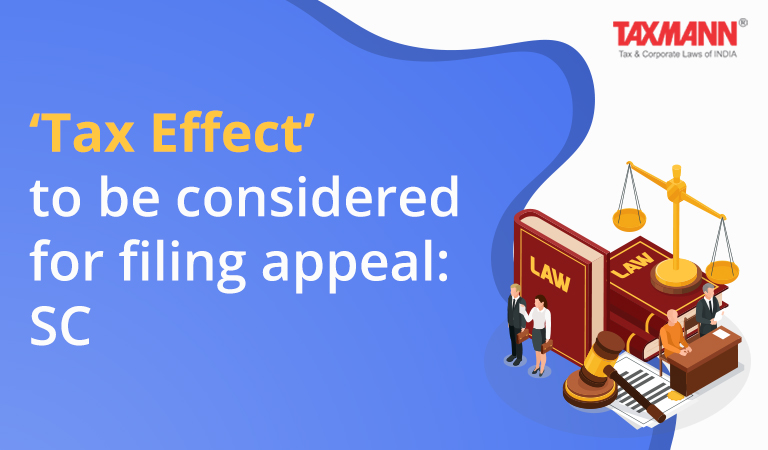‘Tax Effect’ to be considered for filing appeal: SC
- News|Blog|Income Tax|
- 2 Min Read
- By Taxmann
- |
- Last Updated on 21 April, 2022

Case Details: Late Shri Gyan Chand Jain v. Commissioner of Income-tax - [2022] 137 taxmann.com 323 (SC)
Judiciary and Counsel Details
-
- B.V. Nagarathna and M.R. Shah, JJ.
Facts of the Case
The instant appeal was filed by the assessee, challenging the order of the High Court. The High Court has allowed the Revenue’s appeal and set aside the order of the Tribunal wherein the penalty was deleted.
The assessee submitted that the appeal preferred by the Revenue against the order of Tribunal wasn’t maintainable in view of CBDT’s circular No. 21 of 2015 dated 10.12.2015. Said circular provides that the Department cannot file an appeal in High Court if the tax effect in such appeal is less than Rs. 20 lakh.
In the assessee’s case, the penalty levied by the Assessing Officer was Rs. 29,02,743. However, in view of the order passed by the CIT(A) and subsequent demand, the penalty amount was reduced to Rs. 6,00,000/- (approximately). Thus, the tax effect was less than Rs. 20 lakh and appeal preferred by the Revenue before the High Court wasn’t maintainable.
Supreme Court Held
The Supreme Court of India held that before the Tribunal, both the Revenue and the assessee preferred the appeals and the entire penalty amounting to Rs. 29,02,743 was an issue before the Tribunal and before the High Court.
The subsequent reduction in penalty in view of the subsequent order cannot oust the jurisdiction. What is required to be considered is what was under challenge before the Tribunal and the High Court. At the cost of repetition, it is observed that what was challenged by the Revenue was the penalty amounting to Rs. 29,02,743 and not the subsequent reduction of penalty by the CIT(A).
Therefore, it cannot be said that the appeal before the High Court at the instance of the Revenue challenging the order passed by the ITAT was not maintainable given the CBDT circular dated 10-12-2015.
Disclaimer: The content/information published on the website is only for general information of the user and shall not be construed as legal advice. While the Taxmann has exercised reasonable efforts to ensure the veracity of information/content published, Taxmann shall be under no liability in any manner whatsoever for incorrect information, if any.

Taxmann Publications has a dedicated in-house Research & Editorial Team. This team consists of a team of Chartered Accountants, Company Secretaries, and Lawyers. This team works under the guidance and supervision of editor-in-chief Mr Rakesh Bhargava.
The Research and Editorial Team is responsible for developing reliable and accurate content for the readers. The team follows the six-sigma approach to achieve the benchmark of zero error in its publications and research platforms. The team ensures that the following publication guidelines are thoroughly followed while developing the content:
- The statutory material is obtained only from the authorized and reliable sources
- All the latest developments in the judicial and legislative fields are covered
- Prepare the analytical write-ups on current, controversial, and important issues to help the readers to understand the concept and its implications
- Every content published by Taxmann is complete, accurate and lucid
- All evidence-based statements are supported with proper reference to Section, Circular No., Notification No. or citations
- The golden rules of grammar, style and consistency are thoroughly followed
- Font and size that’s easy to read and remain consistent across all imprint and digital publications are applied



 CA | CS | CMA
CA | CS | CMA
